- Home
- Jill Eileen Smith
The Desert Princess Page 2
The Desert Princess Read online
Page 2
“I don’t mind,” I hurried to say. “I have lots of boy cousins, so I am used to them.” I looked into Solomon’s dark eyes.
“That’s good.”
“Yes,” I said, trying to get hold of my suddenly racing heart. “It is good.” My voice sounded strange, like it didn’t belong to me.
He tilted his head to the side and regarded me for a moment. “It is a pleasure to meet you, Naamah.” He bowed at the waist once more.
A giggle escaped my lips. He winked, and I liked him immediately.
“Would you join us, Naamah?” Solomon’s mother called to us and motioned to the seats that circled what had once been a central fire. She turned to a maid who approached, carrying one of the sacks of almonds we had brought. “Divide them among the children first,” she told the maid. “No more than five or six to start.”
I stood in indecision, feeling like an intruder. The food was for the king’s household.
“My mother’s invitations are rarely refused,” Solomon said, his smile inviting. “Come, sit with me.”
His comment startled me. To eat with a prince—this was highly unusual, even for a princess. Men and women did not share the same table in Ammon. Of course, I was not yet a woman.
I followed him, feeling shy despite our crude surroundings, but his mother’s smile put me immediately at ease. “You are a brave girl to come all this way with your father,” she said. The baby now sat on a blanket near her feet, and I noticed a maid hovering near Shobab.
“Inaya says that my father indulges me too much,” I said, deflecting her compliment. I could not tell her how I had begged my father to bring me with him.
“Inaya is your servant.” Bathsheba glanced toward our baggage where Inaya and several servants still worked to unload all that we had brought. I felt a pang of guilt that I had not continued to help her.
“She is my nurse.” I poked one toe against a large stone, avoiding Bathsheba’s gaze. “She has cared for me since Ima . . . since my mother died.”
Bathsheba’s touch on my arm warmed me, and when I looked into her large dark eyes, I felt a sudden kinship and a longing for all I had lost. “Dear child, I am so sorry for you.”
“Thank you,” I said, looking quickly away. I did not like to think about such things.
She squeezed my arm, and my eyes suddenly stung. But a moment later she released her hold and picked Shammua up from the blanket, excused herself, and left the group.
“I am sorry we are not better company,” Solomon said at my side. He took a handful of almonds from a clay bowl that sat between us. “But these are not normal circumstances.” He plopped the handful into his mouth and chewed in silence for several moments.
I did not know where to look or what to do. The king’s wives and daughters, all much older than I, stood in little clusters talking, a few whispering, others barely covering their angry or fearful words. Soldiers and servants moved through the place, and another group of men leading heavily laden donkeys entered the city gates in the distance.
“I would stay with my father,” Solomon interrupted my musings, “if my mother did not need me so much. Sometimes it is a hard decision to know where I can be the best use.”
I looked at him then, and I suddenly did not see a boy of twelve but a young man on the brink of adulthood. His dark eyes held a serious glint, not at all like Jabbar, who, though he was nearly Solomon’s age, still acted like a spoiled child even in sober times.
“It is kind of you to want to please them both,” I said, feeling drawn to him, wishing I could offer comfort.
He nodded briefly, his gaze distant. A moment later he stood and offered me his hand. “Do you want to come with me?”
I allowed him to help me up, then let go of his hand. “Where are we going?” I kept my voice even and tamped down the excitement that filled me. This was not a time for play, and yet I could not stop the feelings of curiosity and attraction for Solomon that rose within me.
“To see who it is that has come, and to check on my father.” He led me toward the city gates as he spoke. “Then perhaps I will be free to look around this place.”
I said nothing as we walked, though I did not miss noticing the big man who followed us. “Who is that?” I pointed to him as we stopped near the huge stone gates.
“I cannot go anywhere without protection.” Solomon nodded to the guard, who stood just out of earshot. “My brother is seeking my father’s life, and if he succeeds, I, my mother, and probably my brothers will forfeit ours as well.”
I gasped, horrified. “Aren’t you afraid?” He spoke so matter-of-factly, as though he were telling me the color of the sky.
He looked at me then, and I saw the briefest hint of vulnerability, even fear, in his gaze. But he quickly masked the fear, took my hand again, and walked us closer to the newest visitors. “There is no point in fearing what we cannot know,” he said in that same calm voice.
But I did not believe he was as brave as he appeared.
We did not stay long at the gate once we saw that another of the king’s allies had brought even more provisions than we had carried, and that Solomon’s father was too busy to even notice his son.
“Later,” Solomon said as we walked away from the commotion, “when things settle down, I will introduce you to my father.”
“What should we do now?” I glanced at the guard following us.
Solomon traced my gaze and sighed. “You are used to being guarded?”
I nodded. “My father has many men to protect us.”
“Then you will not mind exploring with an escort?”
“Not at all.” I offered him a gentle smile, though I suspected he sensed my eagerness.
His cares seemed lighter as we walked. “Years ago,” he said, his tone taking on that of a talebearer, “this palace belonged to another man who sought my father’s life.”
As he continued to tell the tale of King Saul and Michal and Jonathan and Ishbosheth, I think I fell in love with him.
We returned to the central fire several hours later and found it empty of the women and children, the seats now filled with soldiers. Solomon led me to the inner courtyard of the royal family’s rooms and found shelter beneath the overhanging limbs of a large terebinth tree.
“I have done enough of the talking, Naamah. Now you must tell me about yourself. What does a princess of Ammon do with her time?” He sat and leaned against the tree trunk, his hands folded behind his head.
I picked up a twig and twirled it in my hands. “My cousins learn to spin and weave and work colorful patterns in tiles.”
“My mother enjoys those same things.” He looked at me. “But you do not?”
I shook my head. “Abba hired Labir, my tutor, to teach me to read and write like a scribe.” I straightened, proud of my accomplishment. “He says it is fitting for me to learn these things, as I am the daughter of Ammon’s ambassador.” I drew several letters in the dirt to show him.
“What does it say?”
I gave him a curious look. Our languages were not so very different. Surely a prince would know that. “Boy and girl,” I said, my tone nearly mocking him.
He extended a hand. “May I?”
I gave him the stick, and he drew in the dirt beside my words. “This is how we say the same in our tongue.”
“You toy with me. The letters are nearly identical.”
I looked up and caught him smiling. “Close, but not exactly,” he said. “I did have you curious for a moment there.”
“I knew you were jesting.” I playfully smacked his arm, then put a hand over my mouth and pulled back. I was no better than his little brother! “I’m sorry. I didn’t mean to—”
He grasped my hand and gently squeezed. “Do not apologize. We are friends, yes?”
I nodded, but I also knew, because my father told me often, that as a vassal to Solomon’s father, I was not Solomon’s equal.
“Tell me more about your people,” he said, seeming not to notic
e my discomfort. “What gods do you worship?”
His ready smile and relaxed pose made my worries disappear. I sank to the ground and tucked my knees beneath my woolen skirt, hugging them to myself.
“We worship Molech.”
He regarded me, his brows furrowed, his expression darkened. “Molech is the god with seven shelves for seven sacrifices, the last shelf made of bronze arms to hold a human child.” His tone held contempt. But of course, he was Hebrew. He could not understand the hold the priests had over my people, or the fear that led them to do such awful things.
A shudder passed through me. Talk of Molech brought memories of Padi, and if I thought about Padi, the nightmares would haunt me . . .
“Naamah?” I jumped at Solomon’s touch on my arm.
“What?”
He leaned close and faintly touched my cheek. “Did you lose someone to Molech?”
I pulled slightly away. I didn’t want to think about this. But he held my gaze, his own intense, prodding me to tell him what I could not speak of in the daytime.
I glanced at my toes and drew in a long, slow breath. At last I spoke. “My cousin Pada’el. He was six. I was only five at the time.” I paused. “He was my best friend.”
Solomon did not speak for the space of many breaths, but when I glanced at him, I saw a storm of anger brewing in his eyes.
“Why would they do such a thing?” He clenched his hands into fists, and I thought if one of our priests had stood before him then, he would have punched his face. “There is never a good reason to sacrifice a child, or a person of any age.”
“The priests tell us that the gods must be appeased. It is our sacrifice of that which we hold most dear that will bring about the greatest blessings.” I repeated what I had been taught, but in my heart, deep down, I did not believe it.
“What good came from your cousin’s sacrifice?” The anger had seeped from his voice, his words now a mere whisper. The emotion in his tone surprised me, and when I looked into his eyes, I saw such compassion there that I feared I would weep.
He took my hand and held it. “I’m sorry,” he said, and I knew he meant it.
I looked at his hand. The soft hairs of a man’s hand were just beginning to curl over his fingers. He waited, the silence comforting.
I swallowed hard, but I could not look him in the eye. “The priests said it helped because the rains came after that.”
“Our God sends the rains as His blessing to feed the fields, the people, the animals, the needy,” he said. He tipped my chin so I was forced to meet his gaze. “Our God would never require such a thing of His people.”
I studied those intelligent dark eyes, and I felt far older than my ten, almost eleven years. “My mother used to sing me songs of Elohim.” The image of her beautiful face was such a distant memory now. “But our priests tell us that Elohim once asked your ancestor Abraham to sacrifice his only son. Even the merchants and jesters proclaim it when they tell tales.”
Solomon leaned away from me but did not release my hand, holding me as captive with his words as with his fingers.
“Adonai Elohim, the Lord God of Israel,” he said, “did ask our ancestor Abraham to sacrifice his son Isaac on Mount Moriah. Though he did not want to, Abraham obeyed God and took Isaac to that mountain. Yet God stopped him before he could kill his son. It was never God’s intention to let Isaac die.” His gaze bored into mine. “Naamah, our God does not abide human sacrifice.”
His words sank deep within me, making me feel warm and uncomfortable at the same time.
“Mount Moriah is outside of Jerusalem,” he continued. “My father intends for us to build a temple to Yahweh there.”
“You know a lot for a boy.” Suddenly I didn’t want to talk about gods and sacrifices and grown-up things. “Do you play any games?”
His serious gaze held mine, but he slowly relented and offered a curious grin. “Of course. Do you play Senet?”
I shook my head.
“I could teach you.”
I jumped to my feet before he could rise. “Where shall we play?”
He stood and brushed the dust from his robe. “Follow me.”
Later that night, I lay on a mat next to Inaya in a small room in the women’s quarters of the Mahanaim palace.
“Inaya?” I yawned despite my attempt to stop it.
“Yes, child, what is it?” Inaya shifted on her mat and faced me.
“Was my mother as beautiful as Solomon’s mother?”
“Your mother was the most beautiful woman in all of Ammon. No one compares to her, not even the wives of King David.”
I sat up. I could barely see Inaya’s face in the slit of moonlight coming through the high windows and casting small shadows on the floor. “Solomon’s mother has a beautiful voice. Like music.”
Inaya rose up on one elbow and beckoned me closer. I came willingly and snuggled into her sturdy arms.
I thought about what Solomon had said about the God of Israel. “Will you sing me the song Ima used to sing to me?” My eyes drooped, heavy with sleep.
I felt Inaya’s kiss on my forehead, and she began to stroke the hair from my face. She sang, and I imagined my ima smiling down at me.
“Come nigh, Elohim, take my princess to her dreams.
Give her rest upon your clouds.
Let her sail beneath the stars.
Come nigh, little one, let your rest be ever sweet.
Dream of flowers and of birds and laughing waters in the night.
Come nigh, Elohim, take my princess in your arms.
Give her rest under your wings.
Let her wake with morning songs.”
3
We stayed three days in Mahanaim at King David’s makeshift palace, and my friendship with Solomon and his brothers grew. When Solomon was not around, I sought his mother.
“I’m afraid Solomon is off with his father just now, Naamah.” She looked up from her spinning and smiled at me. “But you can help me if you’d like.” She motioned to the mat spread over the hard earth floor. “I’m afraid there are few chairs left around here.”
I stepped into the room and looked around. Colored tiles, though faded, still covered the walls, but the floor had been swept of broken pieces, revealing the bare dirt. I came and sat beside her and tucked my knees beneath me.
“What can I do?”
Bathsheba set the spindle aside and pulled a leather sack from the corner. “I am glad the servants thought to bring something with which to busy our hands.” Washed wool poked from the top of the sack, and she lifted it out, handing it to me. “Do you know how to spin?”
I nodded. Inaya had taught me when I was eight. “A little.”
“There is an extra spindle and distaff in the corner.” She pointed to the place beside her just out of reach. “I would be grateful for your help.”
I jumped up, anxious to please her. It took a few moments to get the rhythm right, but soon we were working side by side.
“Did you know your mother very well, Naamah?”
Her question broke my concentration, and I lost the rhythm of the spindle’s twirling. I was not used to working and talking at the same time, but Solomon’s mother didn’t seem to notice.
“Not very well,” I said, letting the spindle come to a stop so I could start it up again. “She passed on to Sheol when I was five.” I looked beyond her toward the curtainless window. “The images of her are fading, but sometimes I hear her voice whisper to me in the birds’ songs.”
“What was her name?”
“Janaan.”
“That is a lovely name. Like your own.”
Her simple words were like sunshine in the shadowed room. I had never much liked my name, but somehow this woman made it seem beautiful. “Thank you,” I said, finding any other words hard to summon.
She smiled. “When we return to Jerusalem, you must ask your father to bring you for a visit. There is much to see, and I would be happy to show you. I love my sons, but
it is nice to have a girl to talk to.”
Her smile was so warm and friendly that I wished in that moment I could stay with her forever. But too soon Inaya appeared at the open door of the room and called me to come.
“Your father is asking for you, child. It appears the generals are ready for war, and the master wants to return to Rabbah.” Inaya bowed to Bathsheba.
“I understand,” Bathsheba said. She stood, and I did the same.
On impulse, I hugged Solomon’s mother tight, grateful when the woman hugged me in return. She bent to my eye level and leaned close. “You must promise me you will come visit us.” When she touched my cheek, I felt the sudden prick of tears.
“I promise.” I hugged her one more time, then hurried to follow Inaya.
Solomon stood at my donkey’s side a short time later and walked with me to Mahanaim’s gate. “I wish you could stay. I am sorry I could not be with you the whole time you were here.”
“I wish I could stay too,” I said. “When you return to Jerusalem, perhaps Abba will bring me to visit. Your mother invited me.”
Solomon smiled, and the twinkle returned to his eyes. “I would like that.” He looked at his feet a moment.
Why was he suddenly acting shy?
“I could write to you.” He looked up. “Since I know you can read.”
I laughed at the wink he gave me. “I would like that.” I glanced beyond him to where my father stood talking to King David and his three generals. My introduction to the king had been brief, but I was glad to have met him. “Your father speaks often with his men.”
“Many advisors make victory sure.”
I looked at him, trying to make sense of his words, which seemed to hold a wisdom I could not fully understand. “I wish him—I wish you all well.”
“Thank you.”
“What will you write about when you write to me?”
“Do you like riddles?” He patted my donkey’s side.

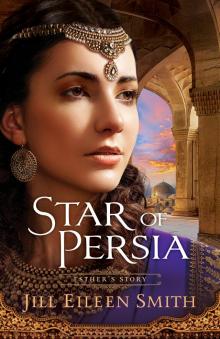 Star of Persia: Esther's Story
Star of Persia: Esther's Story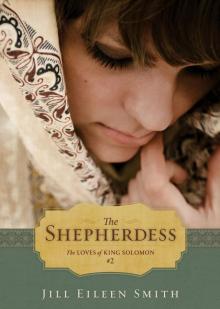 The Shepherdess
The Shepherdess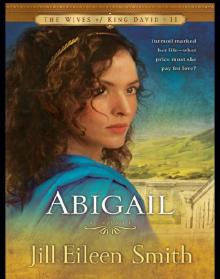 Abigail (The Wives of King David Book #2): A Novel
Abigail (The Wives of King David Book #2): A Novel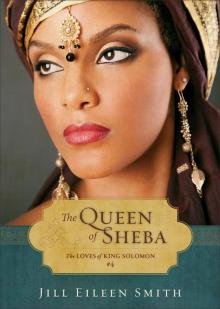 The Queen of Sheba
The Queen of Sheba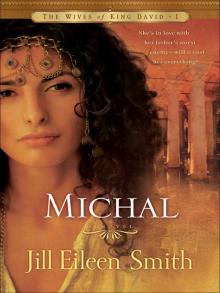 Michal
Michal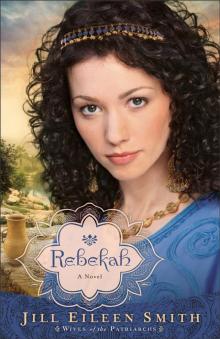 Rebekah
Rebekah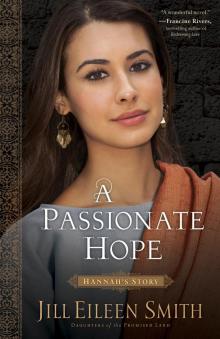 A Passionate Hope--Hannah's Story
A Passionate Hope--Hannah's Story Daughter of the Nile
Daughter of the Nile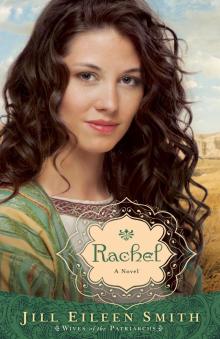 Rachel
Rachel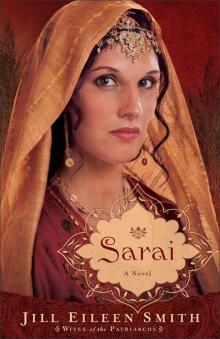 Sarai
Sarai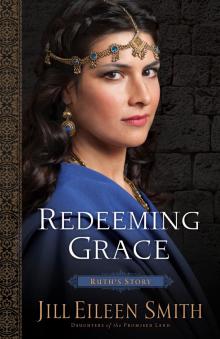 Redeeming Grace: Ruth's Story
Redeeming Grace: Ruth's Story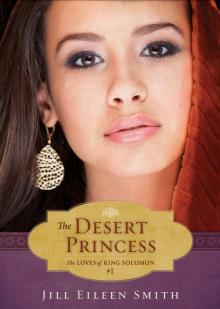 The Desert Princess
The Desert Princess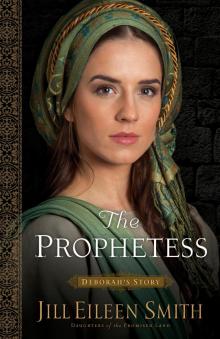 The Prophetess - Deborah's Story
The Prophetess - Deborah's Story